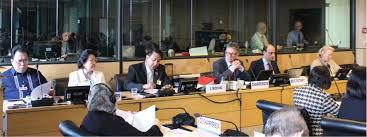
On 16 March 2017, Alkarama submitted its shadow report* on the use of torture in Lebanon to the United Nations Committee against Torture (CAT), in view of the country's first review by the Committee during its 60th session. While acknowledging the encouraging steps taken by the Lebanese government, including adopting a law establishing a National Human Rights Institution and a National Preventive Mechanism (NPM) mandated to monitor all places of detention, Alkarama’s report highlights that the security services continue to resort to torture during interrogations to extract confessions, which are then used as evidence in proceedings, especially in trials before the Military Court.
Intended to provide the CAT's 10 independent experts with alternative information for their assessment of Lebanon’s initial report on the implementation of the Convention against Torture (UNCAT) and recommendations made by the Committee in 2014 during its confidential inquiry on the country issued, Alkarama's report also formulates several recommendations to the authorities to tackle the issue of torture.
Lack of an prohibition and criminalisation of torture in law
Lebanese law currently does not define, prohibit nor criminalise torture. Article 401 of the Penal Code prohibits and criminalises “violent practices not permitted by the law against another person with the intention to extract a confession of a crime or information related to it”, but does not include other purposes such as intimidation or coercion as listed in the UNCAT. Furthermore, perpetrators would only face a one-month to three-year prison sentence, which is clearly inadequate to reflect the gravity of the crime.
A draft law aiming at amending article 401 of the Penal Code is currently pending approval before the Lebanese Parliament. Alkarama hopes that the text will be amended to ensure compliance with the UNCAT.
The abuses committed under the anti-terrorism framework
A disturbing pattern of human rights violations is committed in cases related to Lebanon’s Anti-Terrorism and other national security laws. Suspects are usually arrested by military personnel and detained incommunicado for lengthy periods of time in military barracks, premises that are not conceived to host detainees and that are not subjected to any judicial oversight. There, they are tortured to extract confessions which are then used as a source of evidence during proceedings before the Military Court, a special court largely criticised for its jurisdiction over civilians and its lack of respect for fair trial guarantees.
Of particular concern is the fact that Syrian refugees are increasingly targeted and suspected of terrorism, which puts them at higher risk of being victim of such violations. Not even minors suspected of terrorist crimes are afforded a better treatment. Walid Diab, for instance, was arrested on 12 September 2014 at age 16 at a military checkpoint next to his house in Tripoli, and detained incommunicado at military intelligence premises for three months during which he was severely torture. He was then sentenced for “joining a terrorist group” by the Military Court on the sole basis of confessions extracted under torture during his secret detention.
A prevailing impunity for acts of torture
Torture remains largely practiced in Lebanon because it is unpunished. Dozens of testimonies gathered by Alkarama have shown that judges, often in civil courts and systematically in the military justice system, reject torture allegations brought to their attention without opening any investigation. Even when victims have shown the judge marks they were bearing on their bodies as a result of torture, no investigation was opened.
Indeed, prosecution of State agents perpetrators of torture is jeopardised by the fact that according to article 27 of the Military Code, crimes committed by members of the army and other security officers can be investigated, prosecuted and punished by the Military Court only. This cannot be considered an independent jurisdiction, because the Military Court is itself composed, in majority, by judges appointed by the military and is under the jurisdiction of the same Ministry of Defence.
As of today, none of the more than 300 cases of torture of Nahr Al Bared detainees has ever been subjected to an inquiry, and therefore remain unpunished.
Alkarama calls upon Lebanon to put a definitive end to the practice of torture
These are just a few of the numerous concerns Alkarama raised with regards to the practice of torture in Lebanon which must be addressed as a matter of priority in order to put a definitive end to this practice in the country. If the Lebanese authorities are willing to put a definitive end of torture, they should, among others:
- Appropriately define and criminalise torture and ensure that penalties are fixed in the law and commensurate with the gravity of the crime;
- Ensure that all detainees are afforded, by law and in practice, all fundamental legal safeguards from the very outset of their deprivation of liberty;
- Restrict the jurisdiction of the Military Court to military personnel only and refer all cases involving civilians to the civilian courts;
- Ensure that confessions obtained under torture and the subsequent proceedings are declared null and void and investigate and prosecute all officials who are responsible for extracting such confessions.
Alkarama hopes that the concerns raised in its shadow report will be addressed constructively during the dialogue between the Committee against Torture and Lebanon’s representatives, in order to put an end to torture and other grave violations of human dignity.
*For a comprehensive view of Alkarama's concerns, please refer to the shadow report sent to the CAT which is available on our website.
For more information or an interview, please contact media@alkarama.org (Dir: +41 22 734 1008).
